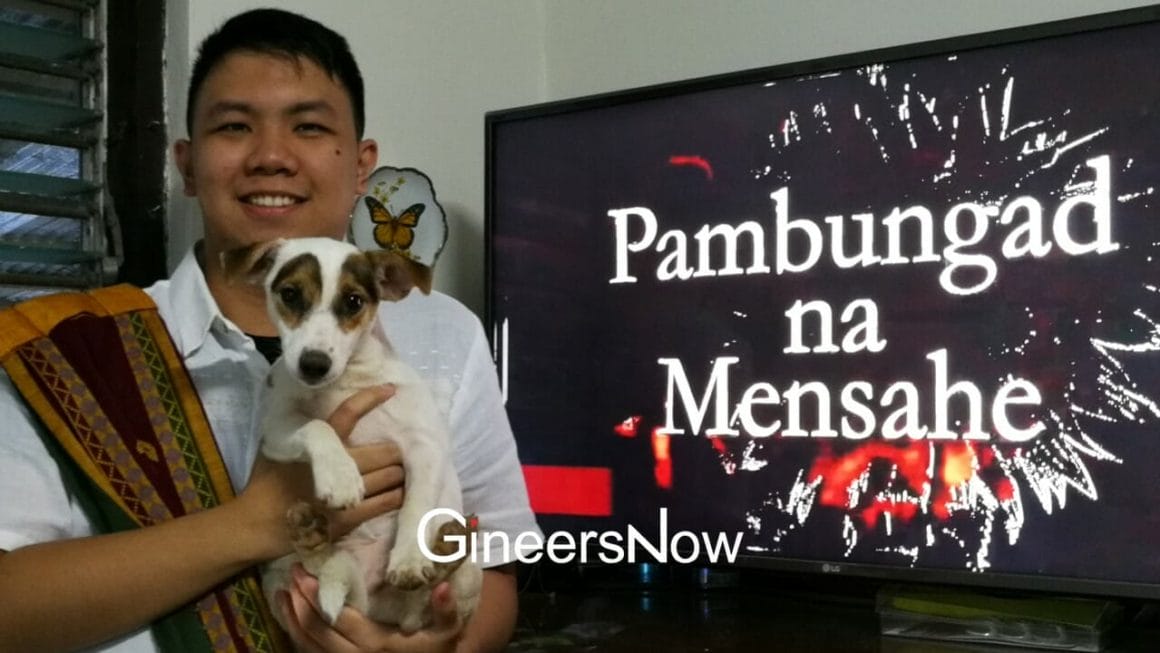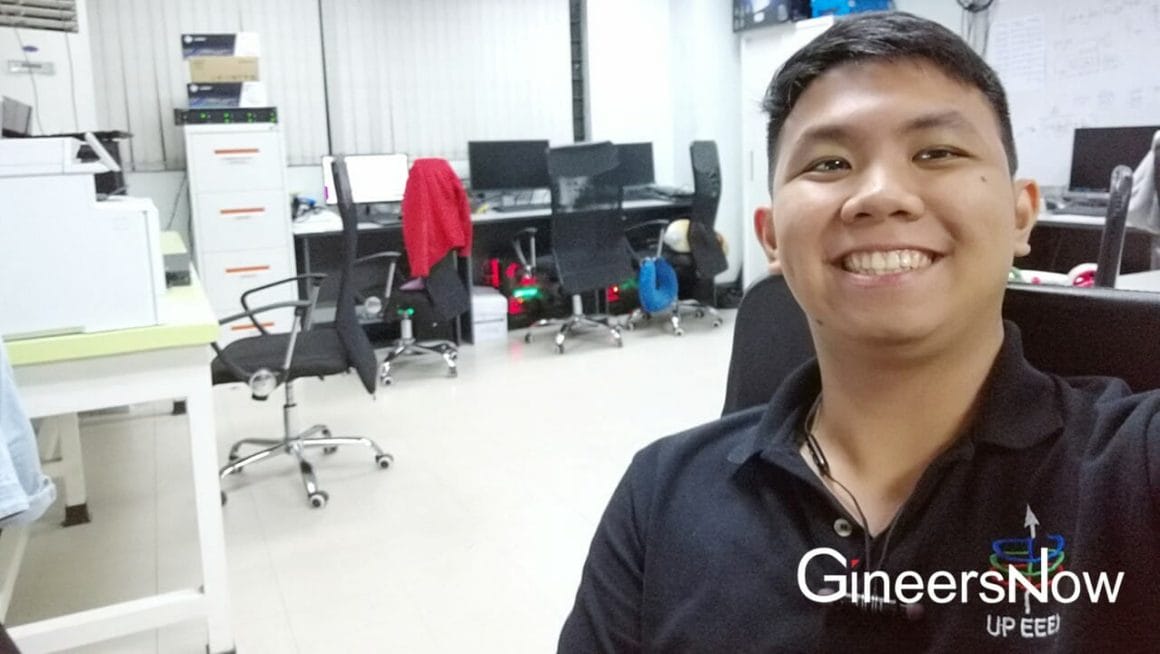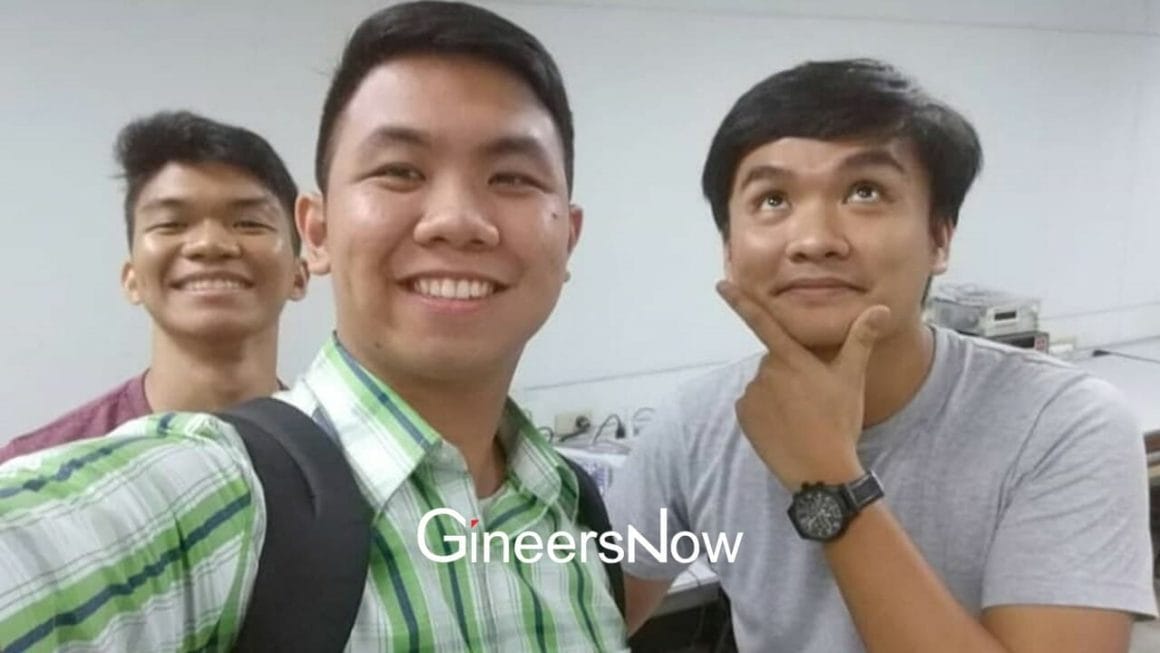Engineer Topnotcher Didn’t Let His Mental Health Struggles Get in the Way of His Dreams.
Our mental health can play a big role in making or breaking our dreams and goals in life.
Engr. Norman David Medina is a living testament to this as he went through depression, anxiety, and self-doubt when he was still taking up Electronics and Communications Engineering.
It was around that time when almost everything went wrong in his life.
But things eventually turned around, and he got to graduate and even secured Top 9 in the ECE board exam with a rating of 87.80%.
In an interview with GineersNow, Norman bravely shared his mental health struggles and how he overcame them.

Summary Highlights
- Course: Electronics and Communications Engineering
- Rank: Top 9
- Score: 87.8%
- School: University of the Philippines Diliman
- Review Center: Excel Review Center
- Challenges: Depression, 5.0 grade in a major subject, balancing his time
- Mother: Professor
- Father: Former salesman turned farmer/businessman

Career Choices
As he grew up, Norman had numerous dreams. He dreamt of pursuing a career related to Fine Arts, Engineering, and Culinary Arts when he was an elementary student.
He started to be interested in literature when he entered high school, as it was the time he became a bookworm.
This led him to consider a profession concerning literature.
But that changed when his cousin introduced Electronics Engineering to him.
It was during that period when the smartphone industry was emerging, and so he thought designing gadgets was a cool job.

When he was a sophomore, their grandfather told them that he wanted to have a doctor in the family and that he was willing to shoulder the expenses.
Because of this, becoming a doctor also crossed Norman’s mind.
He thought it would be convenient for his family, especially since they have lots of hereditary illnesses.
It was his dream until he enrolled in the University of the Philippines Diliman as a Chemistry major.
However, Norman realized that natural sciences weren’t a good fit for him.
He then decided to shift to the Electronics Engineering course.
After all, he excelled in Communication Science and Electronics back in high school, and he was very attracted to all the things Engineering students do.
It was definitely one of the right decisions he made in his life. But then, he still had a fair share of academic failures.

Various Hardships
Although he was initially performing great in school, Norman reached the point where he had academic failures because of the problems that came during his last two years in college.
First, his grandmother had a medical stroke, and it was a huge struggle for him and his family.
It happened at the time he decided to take the summer off because he felt so burned out from simultaneously studying and working as a student assistant.
A week into his vacation, this medical emergency occurred.
For several weeks, they traveled to and from Nueva Ecija and Pangasinan consistently.
Norman deemed this experience as physically, emotionally, mentally, and financially taxing.

When school classes resumed, he felt more exhausted and stressed than before.
He became more devastated when their dogs passed away a few months later.
Any dog lover would know how heartbreaking that can be.
Fortunately, he was still able to attain a line of 1 in his general weighted average in the first semester, but he ultimately fell apart the following semester.
His feelings of anxiety grew because he couldn’t stop himself from worrying about what was happening to his grandma back home.
As a result, he was unable to focus on studying, and negative thoughts clouded his mind every time he was alone.
This eventually led to depression.

To overcome this feeling, Norman diverted his energy and attention to volunteering.
He began supporting a nearby sign language congregation, taking part in looking for deaf people to preach and teach to during weekends.
While volunteering was a worthy endeavor, he failed to balance his time between that and his studies.
That’s when his grades began to drop.
In fact, he received his first 5.00 (singko), which was a traumatic moment for him as he is an overachiever.
This made him feel more depressed than he could ever imagine.
He also developed a lot of anxiety because everything was just too much for him to handle.

To cope with his academic failures, Norman just did what he could at that time.
He took it day by day, one step at a time.
If he had to retake a subject, he just did.
He knew he had to push through because life goes on, and he needed to move forward for his family.
So that was exactly what he did.
Thanks to his positive thinking and dedication to finishing his studies, he finally graduated with a BS in Electronics and Communications Engineering degree in July 2020.

Review Challenges
The time came when Norman had to get ready for the ECE board exam.
He enrolled in a review center for additional guidance and support in reviewing.
During his review, he faced a few difficulties.
One of those is the common power outages in their province, which made his online learning more challenging.
Whenever there was a power interruption, Norman tried to stay in the live classes for as long as his laptop battery and data connection allowed it.

Luckily, the review center recorded their classes and uploaded them to their online platform.
This was a great help for Norman in catching up every time he missed attending classes.
Another strain he went through was that he had to attend to too many household chores since he is an only child and his mom was busy working and taking care of his grandmother.
This means he had a hard time focusing on reviewing as he had other things to finish.
So to make his situation lighter, he made a schedule and did his best to follow it.

That’s not all.
Like any other board exam taker, Norman also had self-doubt.
He revealed that his self-confidence was at its all-time low after failing to graduate with flying colors.
Not only did he doubt that he could pass the board exam in one take, but he also thought that he couldn’t achieve anything great.
But instead of letting those negative feelings bring him down, he used them to push himself to do better.

Pessimistic
The day when he had to take the board exam eventually arrived.
Upon seeing the questions, Norman thought that the exam consisted of equal proportions of easy, average, and hard questions.
Overall, he thought the exam had the right level of difficulty.
Among the subjects, the one related to Electronics gave Norman the hardest time.
Hence, he became a bit of a pessimist at that time, and he was already preparing himself to retake the exam.
But it turned out that he didn’t have to.

Unexpected Result
When the results were out, Norman made it to the Top 10, which he never expected to happen.
He immediately told his mom, who was on a phone call at that time.
The funny thing was his mom ended up hanging up on the person she was talking to after hearing the great news.
Norman found the whole thing funny, but at that moment, he also realized that it wasn’t just his intelligence that made him a topnotcher, but it was also his resiliency.

My Student Life
1. Why did you choose this course? Who or what was your inspiration?
Growing up, I had a lot of dream jobs.
In elementary, I dreamt of pursuing Fine Arts, Civil Engineering, and Culinary Arts.
When I started high school, I became a bookworm, so pursuing literature crossed my mind, but then my cousin told me about Electronics Engineering.
It was also the time when the smartphone industry was starting to pick up, and so I thought designing gadgets was a cool job.

During my sophomore year, though, my grandfather told us that he wanted to have a doctor, and he was willing to shoulder the expenses.
I thought being a doctor would be convenient for my family, especially since we have a lot of hereditary illnesses.
So, that became my dream until I entered UP as a Chemistry major.
In college, I realized that the natural sciences might not be a good fit for me.
I was very attracted to all the cool things they do in Engineering.
Since I excelled in Com Sci and Electronics back in high school, I thought it would be better for me to reignite my dreams of becoming an Electronics Engineer.
Hence I shifted majors.

2. What are your favorite subjects in your entire engineering study? How about least liked subjects?
I loved anything that had to do with logic, so my favorites were my digital circuits, PLC programming, and microcontrollers.
My least favorite were the ones related to communications, although I’ve grown fond of that side of my profession during my board exam review.
3. Have you had any subject failures or disappointing academic performance? What did you do about it?
Yes, I do have some failures of my own because I went through a difficult time during my last two years in college, which I will elaborate in the next question.
As for coping, I did what I could at the time.

If I had to repeat a subject, I just did.
I knew I had to push through because the world doesn’t stop for anyone.
It keeps turning around, and I just have to do my best to catch up.
I also know I have to do this for my family.
I wanted to graduate because I didn’t want them to worry about me anymore.
I just studied while also giving myself time to destress, like drinking.

4. What were your greatest struggles while in college?
My grandmother had a stroke 4 years ago, and it was a huge struggle for me and my family.
It also happened at a time when I decided to take the summer off because I felt so burned out from studying and working as a student assistant.
I always took summer classes because I didn’t want to lose momentum.
A week into my vacation, this medical emergency happened.
For weeks, we drove back and forth between Nueva Ecija and Pangasinan.
It was physically, emotionally, mentally, and financially taxing, to say the least.

The experience woke me up to life’s dark realities, and I went back to school feeling more tired and stressed than ever.
We also lost our dogs a few months after, and any dog lover would know heart-wrenching that can be.
I managed to still pull off a line of 1 GWA in the first semester, but I eventually fell apart the semester after.
My feelings of anxiety grew even greater because I was always worried about what was happening back home.
There were times that I thought, what if something bad happened and I had to stop my studies?
I wasn’t able to focus on studying because every time I was by myself, negative thoughts started to cloud my mind.
I became depressed.

To overcome these feelings of sadness, I diverted my energy into volunteering.
I started supporting a nearby sign language congregation (I’m a Jehovah’s Witness, by the way).
I spent my weekends joining them in searching for deaf people to preach and teach.
It was such a great experience, and focusing on others helped me take my mind off of things.
While volunteering is a worthy endeavor, I wasn’t able to manage my time very well, and that’s when my grades slipped, and I received my first 5.00.

As an overachiever, having a 5.00 is as traumatic as it can get.
Though I may be a little overdramatic, haha.
The bottom line is, though, it sank my feelings of depression even lower than I could imagine.
I also developed a lot of anxiety because I really couldn’t handle any more bad news during those times.
I had to drag myself to graduate eventually.

5. Any topnotcher study tips or tricks that you think others should emulate from you?
Sleep
Never underestimate the value of good sleep.
I always studied better if I had at least six hours of sleep.
Plan
Plan your day ahead.
I have this daily to-do notepad where I write the things I need to accomplish the next day.
Writing it down helps me follow through with my plan.

Schedule
As far as scheduling goes, I usually read books first thing in the morning when my mind is still fresh.
In the later part of the morning, I either memorize my notes or answer some tests.
Then in the afternoon, I attend my review sessions.
At night, when my brain can no longer take in any information, I prepare my index cards and formula wall because it requires relatively less mental effort.

Index cards
Index cards and formula walls are a big help.
It doesn’t have to be perfect.
I organize them per topic, and it doesn’t have to have all the formulas and concepts.
I allot a few index cards as a catchall for every extra formula I pick up along the way.
Also, doing formula walls is a nice way to squeeze those creative juices.

Exercise
Try integrating at least 15 mins of exercise into your daily plan.
I wake up at 6 am in the morning to walk around for an hour or so.
This really helps prime my mind and body for a day of productivity.
Declutter
Declutter your workspace.
It’s easier to focus when there are fewer things that can catch your attention.
Ask
Don’t be afraid to ask questions, even if they may seem stupid.
I asked my review teachers a lot of stupid questions back then, and I’m thankful that they were kind enough to answer them.

6. What is the best engineering school advice that you can give to other students?
Don’t be afraid to fail.
Failure hurts a lot, but it’s part of the human experience.
Failure helps us learn more about ourselves, our imperfections, interests, and talents.
Failure helps us grow.

My Board Exam Experience
1. What were the greatest struggles that you experienced while preparing for the board exam? What did you do to overcome them?
In the province, power outages are more common.
This made online learning more challenging for me.
Thankfully, my review center records our classes and uploads them on their online platform so I can still catch up if I missed anything.
I still preferred participating in the live classes, though, so whenever there was a power outage, I just tried to stay on as long as my laptop battery and data connection would allow.

I am also an only child, which means that I didn’t have the luxury of being left alone during the review process.
I still had to attend to a lot of house chores, especially because my mom was very busy with work and taking care of my grandmother.
I had to accept the situation I was in and make the best of it. Since I had a lot of other responsibilities, I had to be protective of my time and my health.
I did my best to make a schedule and follow it.
The greatest struggle for any board exam taker would be self-doubt.

After failing to graduate with Latin honors, my self-confidence has been at an all-time low.
I thought that I could never achieve anything great. I doubted if I could even pass the board exam in one take.
But I know I couldn’t just wallow in self-pity. I had to do something if I wanted to redeem myself.
So I used all these negative feelings to fuel the fire within, and I pushed myself to do better this time around.
Even so, there are still a lot of times when I feel worthless and incompetent.
But I learned that after acknowledging these feelings, I have to think of a way to turn them around.

2. Did you enroll in a center for your review? Do you recommend doing so? Which one did you go to?
Yes. I enrolled in Excel Review Center. I recommend this review center for ECE grads.
I also recommend going to a review center if you want some added guidance and support.
Studying for the board exam can be very daunting since there are a lot of topics to cover, but a time-tested review center could point you in the right direction.
3. How did you find the board exam? Easy, average, or difficult?
I found it to be just the right level of difficulty; the number of easy, average, and difficult questions was well-proportioned.

4. What were your expectations after you took the board exam and before the results were out? Did you have a feeling that you would be at the top?
I was a bit of a pessimist. I thought I would be marked as “Condi” or Conditional at most.
I found the Electronics subject to be the hardest.
I never would have thought that I would be in the top 10. Honestly, I was already prepping my mind for a retake.
5. What did you do the first minute you discovered you topped the board exam?
I went out of my room and blurted out to my mom that I ranked 9th in the board exam.
She was also on a phone call at that time, and she was so shocked by the news that she shouted, “Teka lang, Top 9 ang anak ko” on the phone.
It was epic.

6. Who do you owe your success to?
I owe it to my God, Jehovah, who continues to show me His undeserved kindness.
I owe it to my parents and grandparents, who supported my academic journey and continued to love me despite my failures.
I owe it to my friends and family, who were there for me when I needed them.
I also dedicate my success to the overachievers who have fallen from grace or those who are struggling to rise above the ashes.
This is a reminder that you, too, will have your day in the sun.
You will redeem yourself.
Just continue to work hard and smart and keep the faith.

7. What incentives did you get from your university and review center after your board exam success?
I received some cash incentives from my review center, which I used to celebrate with my family.
8. Share your most effective study habits.
I like mnemonics.
Thankfully my review center provided us with a lot of those. My way of making them was different, though. I didn’t try to make a catchy rhyme-y song out of everything.
I just tried to relate each part of the formula/abbreviation to each other or maybe to something else.
Like if there was a 180 and a 360 in a formula, I just had to remember that the other constant is twice the other.
Something like that.

Use the Pomodoro technique.
I think this is used by every achiever ever.
For me, I did 45 mins of study and 15 mins of rest.
During my rest time, I do push-ups or play 1 round of online chess.
This technique prevents me from burning out.
Index cards and formula walls
Index cards and formula walls are the best way to remember formulas.
Be creative when making them.

Plan your day
Plan your day based on your energy levels.
Try to match the effort needed for each activity to your energy level for a particular time during the day.
Balance in exam
When answering tests, don’t be too confident or too nervous.
Find the balance between the two for optimal performance.

9. Give some important tips for future board exam takers who aim to become topnotchers.
1. Trust and enjoy the process.
2. Always make time for rest.
3. Take care of your health.
5. Focus on the learnings and not on the awards.
5. Be humble.

My Family & Love Life
1. Describe your family, parents, siblings
My mom is a professor, while my father is a former salesman turned farmer/businessman.
My parents have always pushed me to do well in school.
They always pushed me to be the best I could be, and I am thankful for that push because it helped me discover my full potential.
I don’t have any siblings, but I’ve always wanted an older brother or sister though.

2. Did your parents encourage you to study engineering?
No, my father wanted me to be an accountant, while my mom wanted me to follow in her footsteps as a veterinarian, but they were still very supportive of my career choice.
3. Are you in a relationship? or it’s complicated?
I’m not, haha.

The Future
1. Describe engineering in one word.
Sophisticated.
2. Why is engineering important in our society?
Engineering is important because it helps us improve our way of life.

3. Where do you see yourself 10 years from now?
I see myself as a more resilient person, someone who is more mature and can handle life’s curve balls.
I am also hoping to become a skilled software engineer who finally knows what he’s doing haha.
— End of Interview —
Everything you need to know about mental health struggles in engineering school
Mental health struggles are common among Filipino college students, but they can be especially difficult for engineering students. Engineering is a demanding field, and Filipino students often feel like they have to be perfect. This pressure can lead to mental health problems such as anxiety and depression. If you’re struggling with mental health issues in engineering school, you’re not alone. There are ways to get help and support. Here’s everything you need to know about mental health struggles in engineering schools in the Philippines.

Engineering students and mental health
Mental health is often viewed as a taboo topic, especially in the engineering field. Filipino engineering students are under a lot of pressure to succeed and excel in their studies. This can lead to mental health issues such as anxiety and depression.
There is a growing awareness of mental health issues in the engineering community. Engineering students are starting to open up about their struggles with mental health. This is a positive step towards destigmatizing mental health issues in the engineering field.
Engineering students need to be aware of the signs of mental health problems and seek help if they are struggling. There are many resources available to engineering students who are struggling with mental health issues. With the right support, engineering students can thrive both academically and mentally.

The pressure of engineering school in the Philippines
Mental health struggles are common among engineering students in the Philippines due to the pressure of the program. Engineering is a demanding field of study that requires Filipino students to be constantly learning and problem-solving. This can be extremely stressful for some students, leading to mental health issues such as anxiety and depression.
There are a number of factors that contribute to the high levels of stress in engineering school.
The first is the competitive nature of the program. Students are often competing against their peers for grades and internships, which can be very pressuring.
Additionally, there is a lot of pressure to succeed in the field of engineering. With such high stakes, it’s not surprising that many students struggle with their mental health while in school.
If you are an engineering student struggling with your mental health, know that you are not alone.

The competitive environment
The competitive environment of engineering school can be extremely tough on students’ mental health. The pressure to succeed can lead to anxiety and depression, which can in turn lead to poor grades and dropping out.
In addition, there is a lot of pressure to succeed in the field of engineering. With such high stakes, it’s not surprising that many Filipino engineering students struggle with their mental health while in school. If you are an engineering student struggling with your mental health, there is hope.

The isolation of engineering students
When it comes to mental health, engineering students are at a higher risk for isolation and depression. This is due to the high pressure and competition that is associated with the field of engineering.
In addition, the work can be very isolating, and sometimes Filipino engineering students do not have the same support system that they would have in other majors. If you are an engineering student struggling with mental health, it is important to seek out help and resources.
There are many ways to get help, including support groups and family support. You are not alone in this struggle, and there is help available.

The impact of mental health struggles on grades
Mental health struggles can have a significant impact on grades. Filipino engineering students may face unique challenges that can contribute to mental health problems. stress, anxiety, and depression are all common mental health issues that can affect grades.
Students who are struggling with mental health issues may find it difficult to concentrate in class, complete assignments, or study for exams. All of these factors can lead to lower grades. In some cases, mental health problems can even result in students dropping out of school altogether.
There is no easy solution to the problem of mental health struggles in engineering school, but awareness and understanding are crucial first steps. Filipino students who are struggling should reach out for help from friends, family, or professionals. With the right support, it is possible to overcome mental health challenges and succeed in engineering school.

The stigma around mental health in engineering
Mental health is often seen as a taboo topic, especially in the engineering field. Engineering is a demanding and stressful profession, which can take a toll on one’s mental health. Unfortunately, the stigma around mental health problems prevents many engineers from seeking help. This needs to change.
Mental health issues are just as common among engineering students in the Philippines as they are in any other professional course. However, the stigma around mental health prevents many engineers from seeking help. This needs to change.
Engineers are often seen as strong and capable individuals who can handle anything that comes their way. But even the strongest of us have our breaking points. Mental health problems can affect anyone, no matter how strong or capable they may be. The sooner we break the stigma around mental health, the sooner we can get these much-needed conversations started.

Why Electronics and Communications Engineering is a difficult course?
There are many reasons why Electronics and Communications Engineering is considered to be a difficult field of study. For one, the sheer amount of material that must be learned can be daunting. In addition, the concepts can be very abstract and difficult to grasp. But perhaps the biggest challenge is that the field is constantly changing, so students must always be prepared to learn new things.
Of course, there are also many rewards to pursuing a degree in Electronics and Communications Engineering. Those who succeed in this field will find themselves in high demand by employers all over the world. They will also have the satisfaction of knowing that they have mastered a complex and challenging field of study.

Tips on how to pass the Electronics and Communications Engineering board exam
1. The first step is to understand the format of the exam and what types of questions will be asked. Enroll in a trusted review center and join group studies.
2. Next, familiarize yourself with the topics that will be covered on the exam. Make sure to review basic concepts as well as more specific material that may be tested.
3. Finally, practice answering questions under timed conditions to get a feel for how long you have to work on each section and question. This will help you pace yourself during the actual exam.
By following these tips, you can increase your chances of passing the engineering board exam. Good luck!












